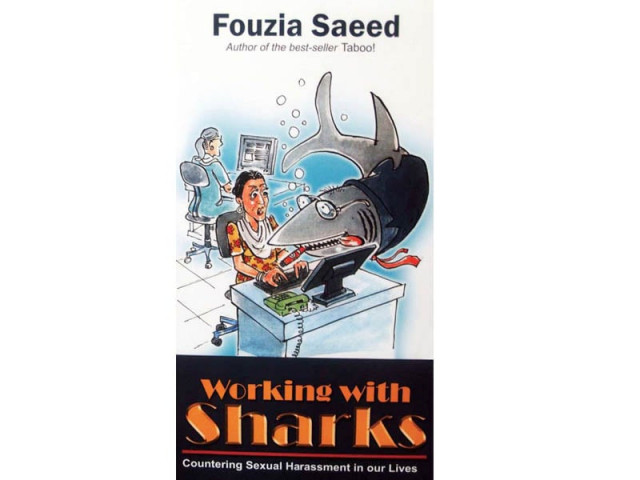Sexual harassment: ‘Women must speak up, men must understand’
First copy bought by women at UN offices for Rs125,000.

Working with the Sharks: Countering Sexual Harassment in Our Lives was officially launched in Islamabad and Karachi on December 22, to coincide with the National Day for Working Women. It was launched in Lahore on Monday.
Dr Saeed explained that the book, which took almost 10 years to be completed, was an account of sexual harassment faced by her and 11 female colleagues by a senior male co-worker. At the time she was working at the United Nations gender cell, she added.
“Speaking up is must. Women do not disclose their problems regarding sexual harassment, unfortunately providing a shield for the harasser,” she said.
Saeed said that in a male-dominated society, a professional woman had to keep “proving herself as a whole person.”
She said it took her three years to prove herself among her colleagues and report sexual harassment.
Speaking to The Express Tribune, Dr Saeed said that with the introduction of legislation against sexual harassment, a space for complaint in this regard has been introduced.
However, she regretted that social space was still missing and there was a need to remove the stigma attached to the problem.
She said only three of her 11 fellow complainants at the UN had the courage to let Saeed mention their real names in the book.
Saeed has worked with women of all ages as a founding member of the Alliance Against Sexual Harassment (AASHA).
She said through this book she wanted to prepare young girls for what “might lie ahead of them” in the workplace.
She said she hoped the book would raise awareness among young women about how to confront sexual harassment.
Dr Tariq Rehman, an academician, said that the book essentially addresses gender power relations and patriarchy.
Saleema Hashmi, the Beaconhouse National University dean of Visual Arts, talked about the stigma attached to sexual harassment.
She said that “protection of honour” was a major obstacle to the reporting of sexual harassment incidents in educational institutions.
Writer, director and actor Sarmad Khoosat commended Dr Saeed story telling ability. He said the writer had woven her personal experiences with facts in a way that the book became an easy read. “These are the stories that we need to tell on television too,” he added.
The book is being translated into Urdu by poet Fehmida Riaz. First copy of the book was bought collectively by women at UN offices for Rs125,000.
Published in The Express Tribune, December 27th, 2011.
COMMENTS (2)
Comments are moderated and generally will be posted if they are on-topic and not abusive.
For more information, please see our Comments FAQ



















Sleeveless T-Shirts, tight jeans and yet there is a wish nobody gaze, a wishful thinking.
Dr Fouzia Saeed ia brave woman in deed.. harassment of Pakistani women working in UN offices face it and those in corporate, banks and public sector organizations and institutes facing harassment on daily basis..congrats AASHA and Mehrgarh